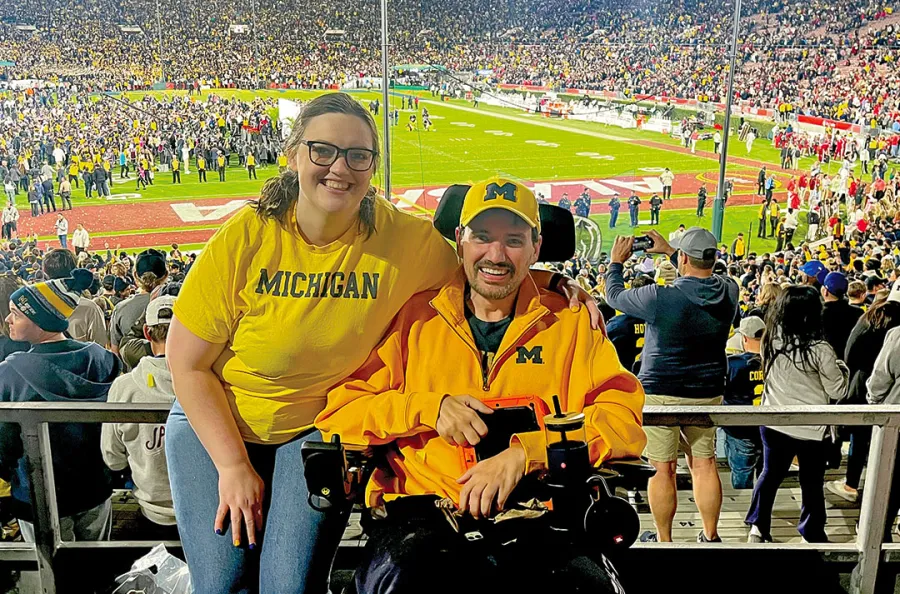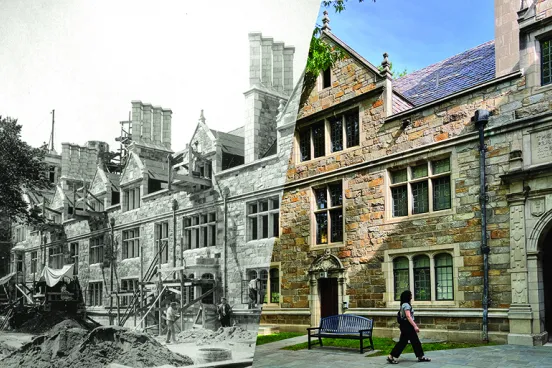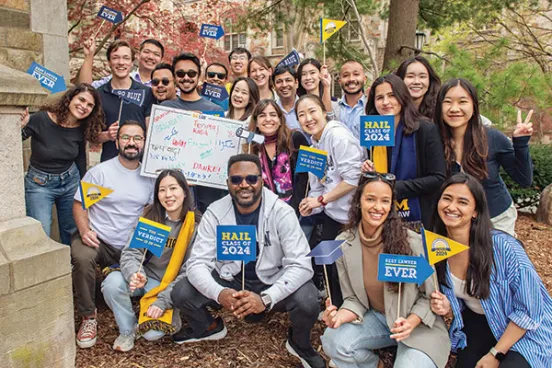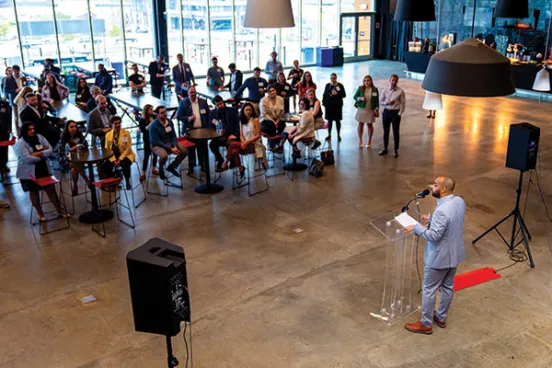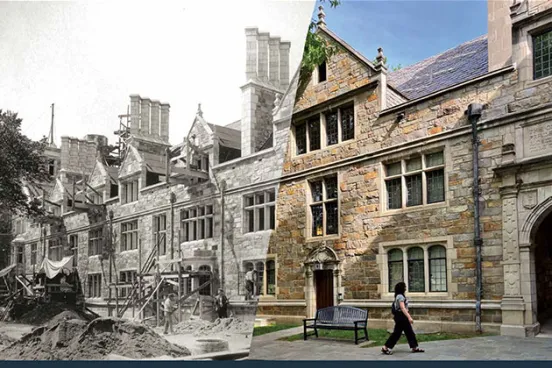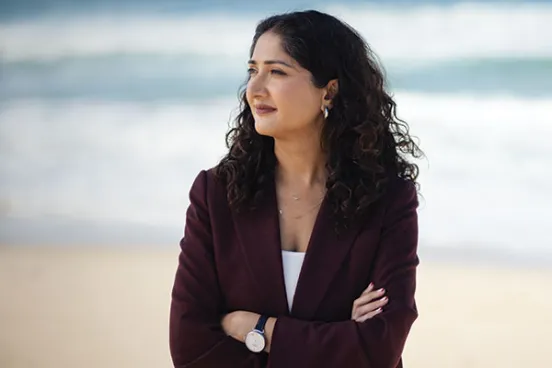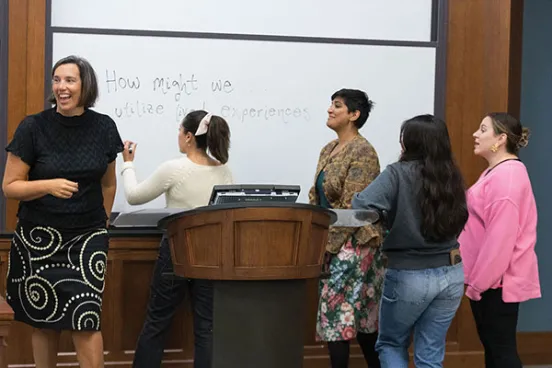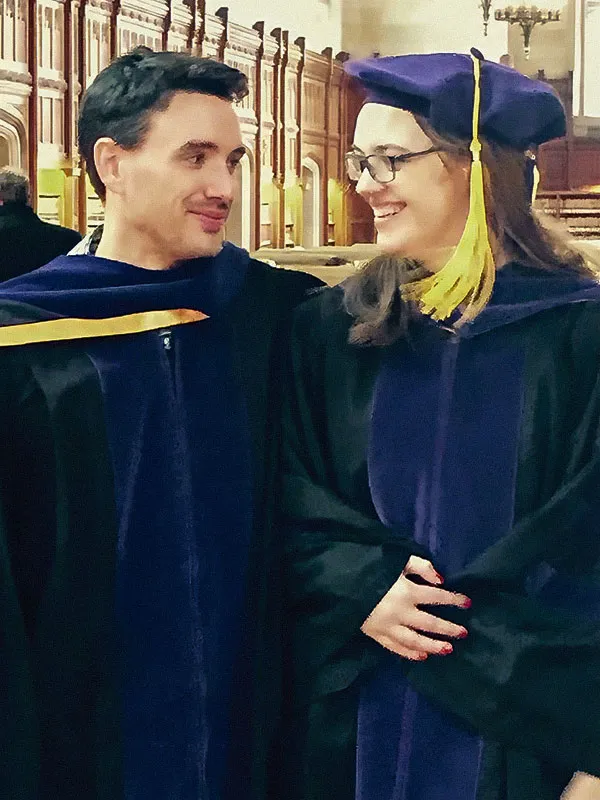
Anyone who met Brian Davis and Katy McNeil in 2021 would have assumed they led a charmed life. Both had graduated from Michigan Law in 2014 and were climbing their respective career ladders: He was associate general counsel at Lincoln International in Chicago; she was an associate at Mayer Brown. Their daughter Ada was 1 year old, and they were looking for a new home in the suburbs.
But behind the scenes, Davis was beginning to experience unsettling health problems.
“I started having issues with my speech late in 2021,” he says. “No one could hear it, though.” But as the weeks passed, the problem became more pronounced.
“His speech sounded a little blurred,” says McNeil. “I think I noticed the shortness of breath more, like he had trouble getting out what he needed to say.”
By spring 2022, Davis started visiting doctors to determine the cause of the problem. And in October, after months of testing, he was diagnosed with amyotrophic lateral sclerosis (ALS), a terminal neurodegenerative disease.
“We did everything we could do at that point to see what our options were to stop it,” says McNeil. “But we quickly learned that stopping it was not possible.”
Diagnosing the problem
The diagnosis came a decade after Davis and McNeil met as summer starters in 2012—standing in line to get their student IDs before orientation at the Law School. While they were in the same section for classes and the same study group, they didn’t start dating until the summer between their 1L and 2L years. Both were in Chicago for callback interviews for their 2L summer and decided to meet for dinner.
“I had dinner with a firm right before that,” says Davis, who now uses a text-to-speech app on his iPad for clear communication. “So it was my second dinner that night.” Things went so well that by their third year of law school, they moved in together and adopted two puppies. After graduation, they headed to Chicago, married in 2016, and started their careers and their family.
Then came the speech problems.
When Davis first started visiting doctors in early 2022, he didn’t know what a long road it would be. ALS is very difficult to diagnose because there is no single diagnostic test; it’s more a process of elimination.
His first neurologist conducted a virtual appointment without a physical exam and told Davis it was just a case of anxiety. While they were still puzzled by Davis’s symptoms, the couple was relieved to learn that the diagnosis was not ALS.
“We said, ‘We don’t know what it is right now, but we’ll figure it out. We can continue on with life,’” says McNeil. “I was going up for partner, and Brian had started his new job at Lincoln, and we got pregnant with Penny, our second daughter. A lot of life happened.”
But Davis continued to have symptoms over the summer of 2022—at one point worrying enough to visit the emergency room, where the neurologist referred him to the ALS clinic. But before he could go, the neurologist who had ruled out ALS blocked his visit to the clinic. More tests ensued until yet another neurologist finally gave a diagnosis of ALS.
“It was a shock,” says Davis. “I was chastised for bringing up ALS with the original neurologist and told I was wasting their resources with my appointments.”
Katy McNeil, ’14We did everything we could do at that point to see what our options were to stop it. But we quickly learned that stopping it was not possible.
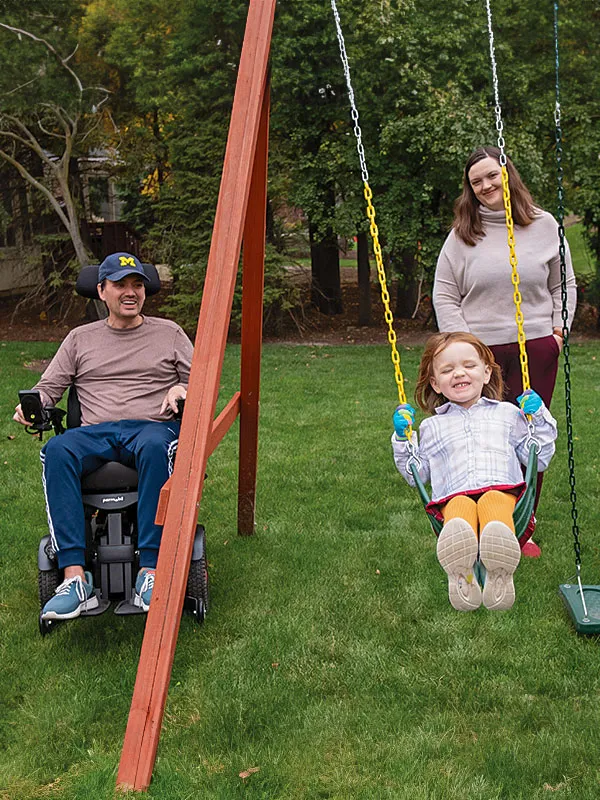
Finding support
The reality of the diagnosis upended their entire world.
McNeil continued with her partner interview, which was only one week after the diagnosis. “I remember totally dissociating, like, ‘I have to be a different person for the next 45 minutes.’” Meanwhile, Davis decided to quit his job, which involved so much verbal communication that it would have been very difficult to continue.
“I also wanted to save my energy for being with my family, and cooking them dinner, and playing with my kids,” he says. While their 1-year-old is too young to understand what is happening, they have been as open as possible with 4-year-old Ada.
“She knows her dad is sick. She knows his illness is terminal,” says McNeil. “But she is, as all kids are, an optimist. We told her last week that Brian had to go to the hospital for a procedure, and she said, ‘So he won’t be sick anymore.’ I love that she’s an optimist, but it’s obviously really challenging because we have to revisit a lot of conversations.”
Since the diagnosis, the disease has continued to progress, including reaching Davis’s limbs. He started 2023 with a New Year’s trip to Disney World and clocked 20,000 steps in one day. But by April—the month their second daughter was born—he started using a walker. A few months later, he was starting to use an electric wheelchair, which he now uses full time. By late 2023, ALS had significantly weakened the muscles he uses to speak.
Despite the disease’s progression, the couple is finding strength in their support network, including his mother, Eva, who lives with the couple and helps care for her son.
They also have a great resource in the Les Turner Foundation, which helps them manage Davis’s illness and provides support for navigating complex medical and insurance paperwork, enrolling him in a clinical trial, and other services. The foundation also provides a social worker who the couple says anticipates their needs before they realize they have them—whether it’s emotional support or tracking down a lift that helps Davis in and out of the house.
“Les Turner does a lot of education, too, like webinars and support groups,” says McNeil. “So much of what we’re dealing with, we’re not the first people to deal with it. And just talking to other people has been such a huge lifesaver.”
She adds that friends from law school also have been there for the couple.
“We have a really strong Michigan Law community that's been absolutely fantastic,” says McNeil. Those who live nearby have done everything from making meals to designing a playroom for their daughters to throwing a third birthday party for Ada when McNeil was 38 weeks pregnant. One even arranged for the couple to travel to Los Angeles along with other Michigan Law friends to see Taylor Swift at SoFi Stadium. They returned to Southern California a few months later to watch the Wolverines beat Alabama at the Rose Bowl.
Experiences like that allow the couple to continue to find joy in a life that now revolves around ALS. They also hold out hope that ongoing research will eventually make ALS a chronic, rather than terminal, disease.
“We want to do whatever we can do to push that process forward,” says McNeil. “That means education and teaching people about this disease. So we’ve made it our mission to talk about it and to educate people about what we’re going through.”
When asked where he finds joy and inspiration despite his disease, Davis’s reply is simple: Katy.
“ALS has taken away my ability to do pretty much everything,” he says. “I really miss reading to my daughters or having a normal conversation. In terms of inspiration, it’s really Katy; she never complains. She’s basically a single parent, Big Law partner, and caretaker for pretty much the most demanding disease. If she can keep going, I can, too.”
